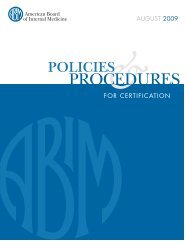The SRA Symposium - College of Medicine
The SRA Symposium - College of Medicine
The SRA Symposium - College of Medicine
You also want an ePaper? Increase the reach of your titles
YUMPU automatically turns print PDFs into web optimized ePapers that Google loves.
After A Day Of Infamy, December 7, 2003—What Regulatory Ethics<br />
Have Become at the National Institutes <strong>of</strong> Health by August 31, 2005<br />
John J. Gillon, Jr., J.D., M.P.H.<br />
Senior Attorney<br />
Office <strong>of</strong> Petitions, U.S. Patent and Trademark Office,U.S. Department <strong>of</strong> Commerce<br />
Visiting Fellow, Center for Biomedical Ethics/University <strong>of</strong> Virginia Health System<br />
Serves pro bono on the Institutional Review Boards <strong>of</strong> Walter Reed Army Institute <strong>of</strong> Research,<br />
Walter Reed Army Medical Center, and the American Red Cross Biomedical Services<br />
2921 Stanton Avenue<br />
Silver Spring, MD 20910-1218<br />
Phone/FAX (301) 589-6527<br />
john.gillon@starpower.net<br />
Authors’ Note<br />
<strong>The</strong> views presented are those <strong>of</strong> the author and do not represent the policy or opinion <strong>of</strong> the<br />
Government <strong>of</strong> the United States or any <strong>of</strong> its agencies.<br />
Comments from Society members are welcomed.<br />
Papers<br />
Abstract<br />
For the 17,500 employees <strong>of</strong> the National Institutes <strong>of</strong> Health there may have been a sense <strong>of</strong><br />
unprovoked attack when they awoke to find that Los Angeles Times reporter David Willman<br />
had targeted their institution with allegations that conflicts <strong>of</strong> interest and their corrupting influences<br />
were standard operating procedure at the NIH. <strong>The</strong> Congressional and Inspector General<br />
investigations <strong>of</strong> these allegations demonstrated that fewer than 70 scientists—maybe fewer than<br />
50—had violated ethics rules then in place. Yet, the newspaper’s indictment <strong>of</strong> the NIH staff was<br />
carried as a top story by news operations throughout the nation, even <strong>The</strong> Washington Post buried<br />
on page the vindication <strong>of</strong> the many thousands <strong>of</strong> dedicated women and men at the NIH. Why<br />
and how the staff and institutes <strong>of</strong> NIH came under—in the last half <strong>of</strong> the 20th Century—an<br />
unmeasured and almost wholly undefended attack is lucidly and elegantly discussed by Evan G.<br />
DeRenzo, Ph.D., in a recent article for the Kennedy Institute <strong>of</strong> Ethics Journal, and need and will<br />
not be re-examined here. Better now to reflect upon the substance <strong>of</strong> some <strong>of</strong> the changes that<br />
have taken place over the last decade—that is, to look at the regulations in the wake <strong>of</strong> legislation<br />
and the administration <strong>of</strong> former NIH Director, and Nobel Prize winner, Harold Varmus, M.D.,<br />
and how those regulations have been changed twice in 2005 following the December 2003 L.A.<br />
Times allegations. Whether any <strong>of</strong> the feared mass exodus <strong>of</strong> scientific talent from the NIH occurs<br />
likely will have more to do with whether the monies and the freedoms to engage in challenging<br />
and state-<strong>of</strong>-the-art scientific research continue to be made available to NIH staff than what stocks<br />
NIH staffers can own and for whom they can consult.<br />
Introduction<br />
Flooded with 1,300 comments by employees and threats <strong>of</strong> high-level defections, the head <strong>of</strong> the<br />
National Institutes <strong>of</strong> Health agreed [on August 25, 2005,] to loosen some <strong>of</strong> the ethics rules he<br />
unveiled in February.<br />
* * *<br />
Congress prompted the new regulations after lawmakers discovered that dozens <strong>of</strong> scientists had<br />
not revealed income and other perks they received from for-pr<strong>of</strong>it companies, as required.<br />
(Emphasis supplied)<br />
-- <strong>The</strong> Washington Post, Friday, August 26, 2005 (Connolly 2005)<br />
2005 <strong>Symposium</strong> Proceedings Book 77

















